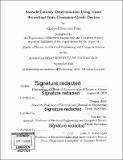Saccade latency determination using video recordings from consumer-grade devices
Author(s)
Saavedra-Peña, Gladynel
DownloadFull printable version (13.96Mb)
Other Contributors
Massachusetts Institute of Technology. Department of Electrical Engineering and Computer Science.
Advisor
Thomas Heldt and Vivienne Sze.
Terms of use
Metadata
Show full item recordAbstract
Accurate quantification of neurodegenerative disease progression and neurocognitive decline is an ongoing challenge that muddles efforts to understand and treat these conditions. The golden standard to track neurodegenerative disease progression is a neurocognitive assessment administered through a series of forms and questionnaires, both of which suffer from high retest variability. Thus, there is a need for a validated biomarker that can accurately track neurocognitive decline or disease progression unobtrusively. Clinical studies have shown that saccade latency - a measure of eye movement reaction time - can be significantly different between healthy subjects and neurodegenerative disease patients. Hence, we propose and test a system that enables measurement and tracking of saccade latency outside of the clinical environment, without relying on supplemental or special-purpose illumination. iTracker-face, a variant of a deep-learning approach that estimates gaze on mobile devices, was tailored to measure saccade latency on video sequences obtained with an iPhone 6. Additionally, our model-based approach for saccade latency estimation provides a means to automatically detect eye position traces that should not be included in further analysis (AUC = 0.92). We recorded over 20,000 saccade latencies in 30 healthy subjects and observed that there is a substantial amount of intra- and inter- subject variability in the mean saccade latency ([mu]) and associated standard deviation (sigma). Among the subjects with the most saccade latency measurements, [mu] ranged from 128 to 173 ms, while a varied from 24 to 53 ms. Our results suggest that accurate and robust saccade latency determination is feasible using consumer-grade cameras and might therefore enable unobtrusive tracking of neurodegenerative disease progression.
Description
Thesis: S.M., Massachusetts Institute of Technology, Department of Electrical Engineering and Computer Science, 2018. Cataloged from PDF version of thesis. Includes bibliographical references (pages 87-92).
Date issued
2018Department
Massachusetts Institute of Technology. Department of Electrical Engineering and Computer SciencePublisher
Massachusetts Institute of Technology
Keywords
Electrical Engineering and Computer Science.